Wondering if you should adopt a barn or homestead cat? The answer is absolutely! The benefits of having a feline friend on the homestead are many. This article discusses some of the reasons why adopting a barn cat (or two) for your farm or homestead is a great idea. We also list some tips and recommendations for raising barn cats successfully and healthily.
Perhaps the most obvious reason for bringing a barn cat to your homestead is because they are fun companions and make for some lively entertainment, but those reasons aside, there are actual health benefits and scientifically based health related reasons for keeping a barn cat.
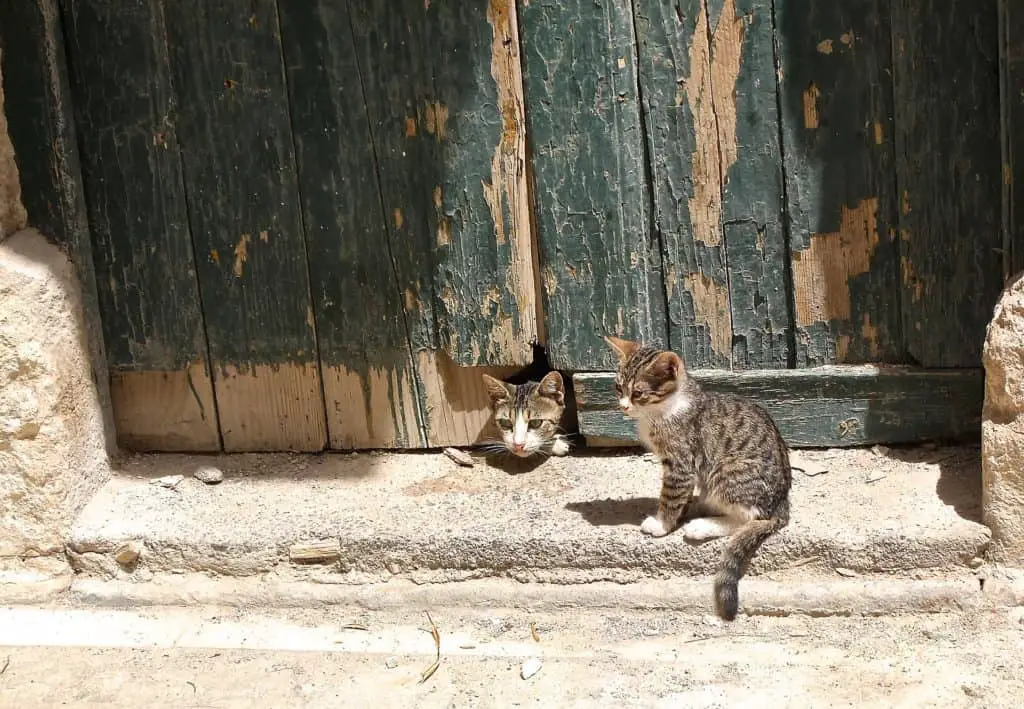
We have 8 barn cats that live on our property, and one very entitled house cat (an abandoned kitten from one of the barn cats). Though we started with 2, the numbers grew as neighbors failed to take care of their own animals, and kittens “happened” or “strays” ended up living on our property. I don’t blame the cats though. We take good care of them, and we have ample room for them to hunt and wander.
What is the difference between a house cat and a barn cat? If you live on a homestead or farm environment, a barn cat is a cat that spends the majority of its time outdoors. Technically, a barn cat will not be allowed to sleep in the house, but by definition, has a domiciliary location in a barn or out-structure of the farm. Ironically, although we have provided shelter for our barn cats, they typically end up sleeping wherever they want.
Because barn cats spend so much time outside, they are susceptible to illness, pathogens, and predators that the typical house cat won’t be exposed to. For this reason, it is wise to have your barn cats vaccinated, including the rabies vaccine, the FVRCP (Feline Viral Rhinotracheitis, Calici virus and Panleukopenia) vaccine, and the FELV (Feline Leukemia vaccine). But we’ll cover vaccines later.
1. Keep vermin and rodent numbers in check
The most popular reason most farmers, homesteaders and ranchers keep barn cats, is to control the vermin or rodent population, including rats, mice, moles, voles, and gophers. Cats are excellent hunters, and a great natural mouse deterrent. Often, just the presence of a cat will keep mice away. Mice typically only build their nests and homes where they feel safe. If they smell or see a cat, they will seek another location. Though a cat won’t keep all mice away (as mice will nest in hidden places such as walls or crevices), it is certainly helpful.

If you have studied history you know that rats and mice are disease carriers. (Think the middle ages and the black death). Though the black plague is controlled now, rats are still known to carry diseases such as antibiotic-resistant E. Coli and C.Diff. If that wasn’t bad enough, you are just as likely to get sick from contact with a rat or mouse’s droppings or urine as you are with touching the varmint itself. So, having a cat around the farm to keep the rodent population at bay is definitely a plus. (Did you know that they use cats at Disneyland to control rodents? They also kept them on ships during World War II.)
2. Low maintenance
Barn cats are also extremely low maintenance companions. Though they will not always be the friendliest, they also won’t require all of your attention as a house cat might. Most barn cats are completely content spending their time outside, laying in the sun, hunting, sleeping, or foraging. Additionally, once spayed or neutered, it takes a few vaccinations, and barn cats are pretty much good to go.
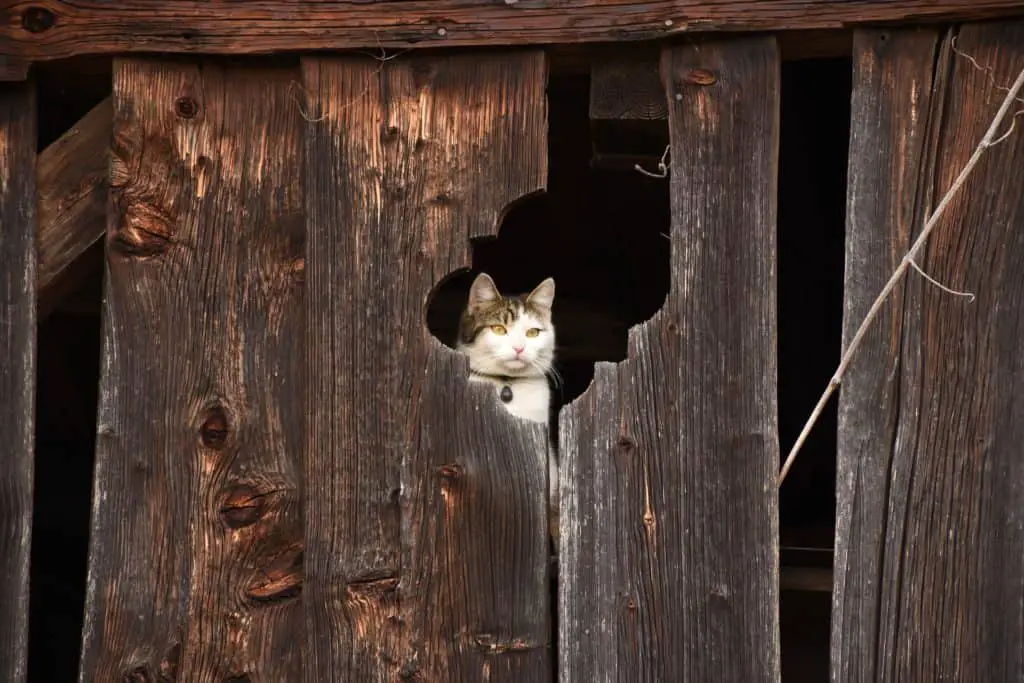
3. Kill insects and bugs
Though it is well known that cats are excellent at rodent control, many people don’t realize that cats are also excellent insect exterminators. It is believed that cats hunt and kill insects such as cockroaches and grasshoppers because it is their natural instinct. As a matter of fact, according to Dr. Meghan Herron, veterinarian and clinical assistant professor of behavioral medicine at Ohio State University, the act of insect hunting that cats participate in often has little to do with hunger, but is more because it is fun and instinctual.
4. Companion animals for other farm life – including chickens cows and horses
Not only can a barn cat be a fun human companion, but your outdoor felines may also befriend your livestock or chickens. Remember how the wise horse trainer Tom Smith surrounded his champion racehorse Seabiscuit with an old mare, and a stray dog to calm him down and help him settle in?

It’s a known fact that many animals thrive from, and actually prefer the companionship of other species. On our homestead, the rescue pup, Layla has now become the guardian of the chickens, including alerting us to the little Rhode Island Red that accidentally gets locked outside of the coop from time to time. And, believe it or not, our once fierce pup has even been befriended by several of the barn cats. It has been remarkable to watch them slowly earn her trust, and vise versa. Now, the nightly routine involves Layla touching noses with Pretty Girl, Big Kitty, and Zero before heading to bed for the night.
5. Companion animal for humans
Additionally, even though a barn cat isn’t going to be the type to climb onto your lap in the evening, there is something remarkable when these otherwise free roaming souls let you into their heart. We have one barn cat, affectionately named roly-poly (after her quirky behavior of rolling on the ground while playing with sticks or other objects), who always follows me at a distance of about 10-15 feet, hiding in the shadows, and watching what I’m up to. Sometimes, when working in the garden, or on other outdoor projects, Roly Poly will surprise me with a small greeting, and let me pet her briefly. Likewise, I often find myself watching her closely as he hunts mice or insects near the chicken coop or storage barns. She’s quite the mouser, and has brought great joy albeit subtly.
In this way, I find all of the personalities on our homestead seem to have their place, and add to the flavor and harmony of our little home. Of course we are the kind of folks that name each of the chickens, and just can’t bring ourselves to do anything other than let our hens grow old (even when they are long past their egg-laying prime).
6. Save you money (pest control), keep rodents and bugs from eating feed.
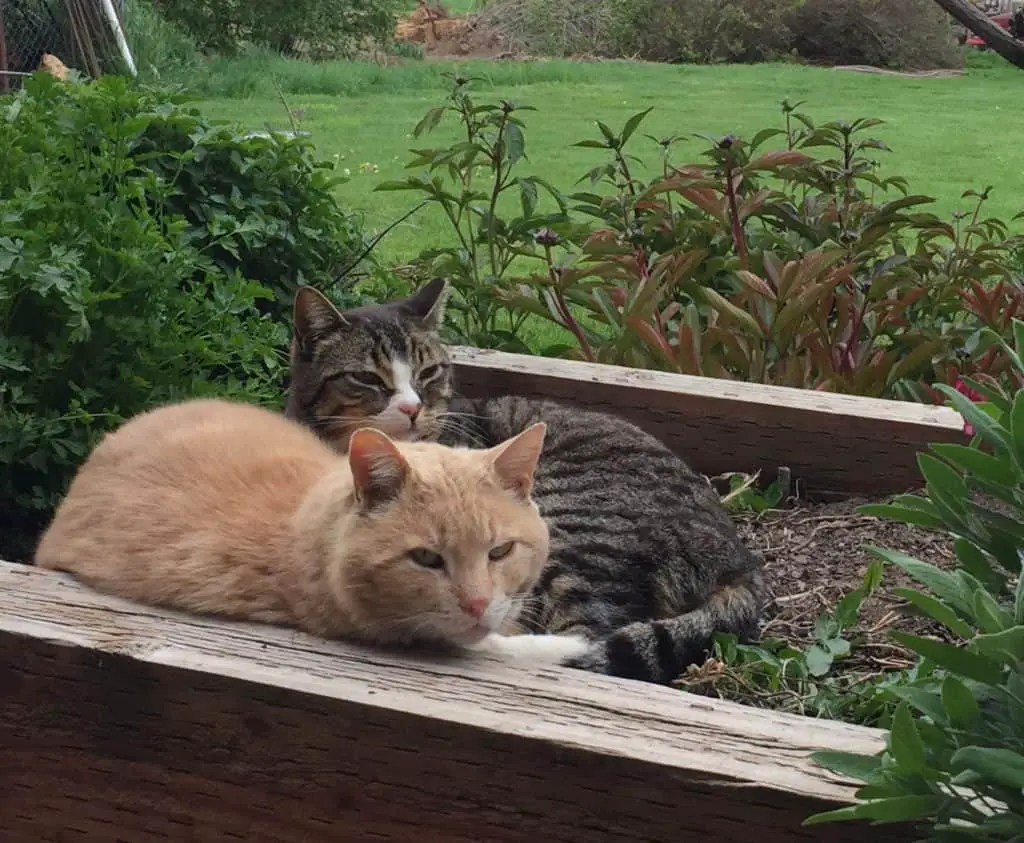
Having a few good mousers around can save you hundreds of dollars a year in lost or spoiled animal feed. Not only do rodents eat your horse, cow, or poultry feed, but their urine, fur, and feces are capable of ruining 10 times as much food they eat, through contamination. If you’re wondering how big the problem is, the US Department of Agriculture estimates that more than $2 billion dollars worth of feed is destroyed by rodents each year.
7. Rescue an orphaned animal
Probably the most passionate reason I believe you should get a barn cat is because you can give an orphaned or abandoned cat a good home. There are folks who will tell you that certain breeds are better mousers than others, but I am a fan of rescuing cats that wouldn’t otherwise have a home. Now I’m not saying that any old cat should be left out in the barn, or expected to be an outdoor enthusiast, but if you follow the recommendations set forth below, you can easily find a shelter cat or two that will do perfectly well in a homestead or farm environment without needing too much work or care. We recommend the best friends league bestfriends.org, whose motto “no homeless pets” is a motto we firmly believe in. They can help you locate a shelter near you, or you can choose to adopt directly from their facility.
Five essentials to raising healthy barn cats
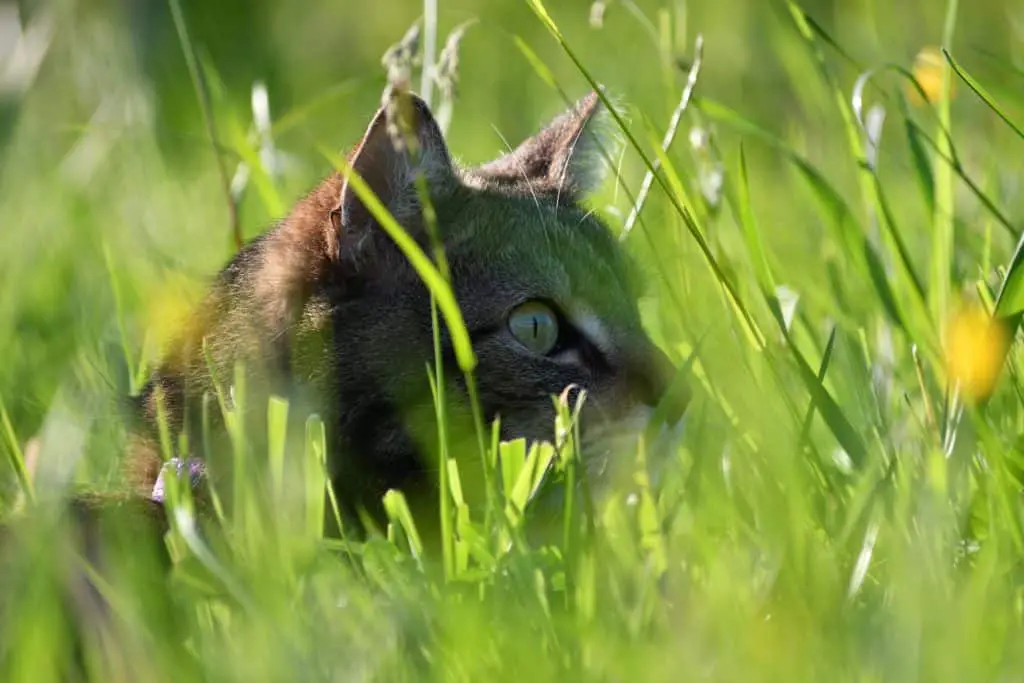
1. First, it is easiest to start with kittens if possible. And, especially kittens that have come from another farm or homestead, or are at least accustomed to living outside.
It is best to find kittens that have come from another farm or homestead, or are at least accustomed to living outside. We see ads for these types of kittens all of the time at our local farm supply store and grain supplier store. It is quite typical for someones farm or barn cat to have a litter of kittens before they have spayed the cat. These litters are perfect for starting your own barn cat crew.
2. Lock them in a barn or shed, tack room, or other outbuilding at night, at least for the first two months. This will help them learn where they will be fed, and will keep them safe from coyotes, night hawks, or other predators while they are young. It also creates a sense of “home” and security for them while they are learning their new lifestyle.
3. Get your cats spayed or neutered! Non-spayed females wander when in heat, or attract males, and ultimately bring more kittens. Un-neutered male cats will leave your property to look for a mate, and will fight with other cats, which can bring about serious injury or death.
4. Vaccinate. First things first, sometimes you may have a challenge catching a barn cat in order to have it spayed, neutered, or vaccinated. When we have had feral cats show up on our homestead and hang around, my husband has used a raccoon trap to catch them and have them neutered or spayed. Typically, the cats become “tamer” much faster once they have been neutered or spayed.
Additionally, you may need to take your cats to the veterinarian to have them vaccinated. Many farmers vaccinate their own cats with vaccines purchased at the tack store. Most tack store will have vaccines available in their cooler section with all kinds of refrigerated medications and vaccinations.
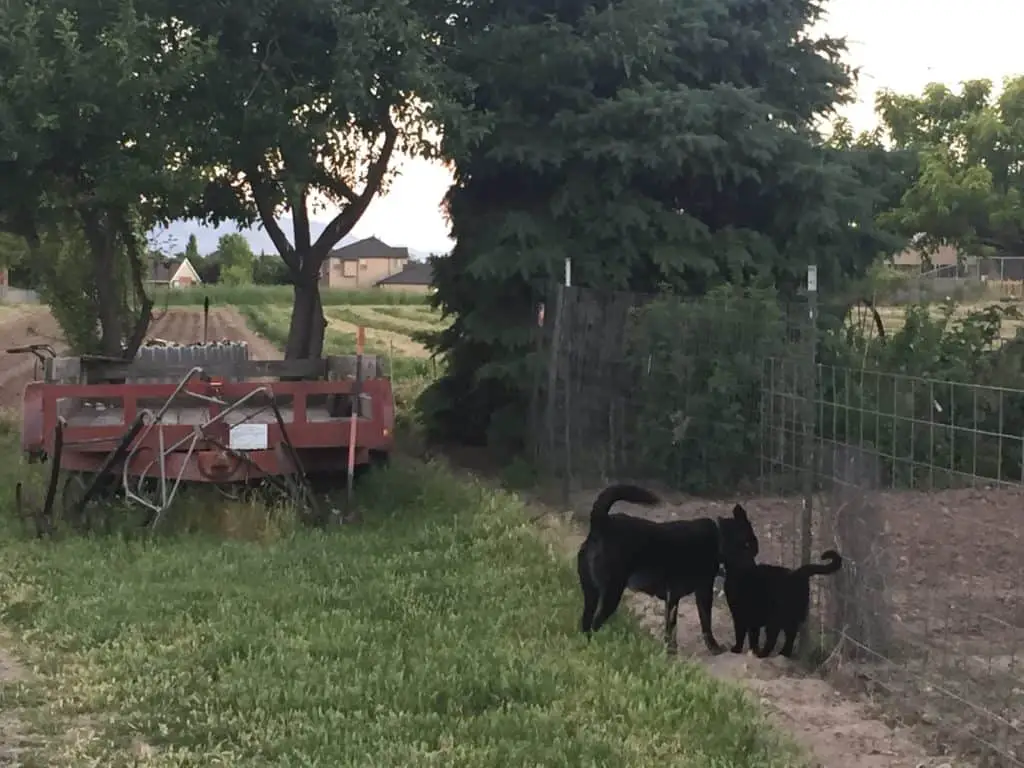
5. Feed them good food. If you want your barn cats to stay healthy, and to stick around, feed them decent quality food. If you don’t, they are likely to wander to a neighboring homestead or farm where the food might taste better. Now, I’m not saying that you need to go out and purchase the best quality, expensive food out there. I am however, saying that you ought to avoid the really cheap stuff with corn filler and by-products. It will pay off to feed your cats with a decent quality food. It will not deter them from hunting, but will ensure they stick around.
And there you have it. We absolutely love having our feline friends around the homestead, and have had a substantial decline in rodent numbers since making efforts to keep barn cats around and healthy. We imagine you will have a similar experience if you decide to invest a little extra time to barn cat adoption and upkeep.

